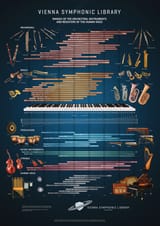>>128181188
>>128181417
>You have schizophrenia
I don't. I recognize your retarded, arrogant nonsense every time you post. You always deflect and never actually offer any counterarguments, just bang your head against the wall like the fucking moron you are.
>woodwinds, brass, strings, percussion, keyboards of various designs, sizes, materials, the human voice, any every possible listenable register
>somehow the same as farting
How does it feel to be so arrogant yet so fucking stupid?
Why don't you reply to this?
>massive range of acoustic instruments from vastly different instrument families (strings, winds, brass, percussion, keyboards, etc.) that transformed over centuries
>vocal music from Gregorian chant to modern extended vocal techniques
>innovations in orchestration and texture by composers like Berlioz, Wagner, Debussy, Ravel, Grisey, Ligeti, Stockhausen, etc.
>use of space and acoustic manipulation in different venues
>modern works that use electronic instrumentation or focus solely on timbre, including musique concrete, spectralism, electroacoustic music, microtonal music and many more
Can you please explain how every instrument imaginable (acoustic and INCLUDING ELECTRONIC INSTRUMENTS) offers a "narrow range" and "limited kinds of sounds"? Can you do that? Or will you deflect like the retarded coward you are?
4chan Search
2 results for "5612f8fa3e37ec0c421d24e178fe4958"
>>126758219
>have very limited timbral variety
Why do you keep repeating this absolutely retarded, demonstrably false mantra? It's frankly absurd. The orchestral palette alone includes:
>strings (bowed, plucked, harmonic overtones, mutes, sul ponticello, sul tasto, col legno…)
>woodwinds (single reed, double reed, air jets, overblowing, multiphonics possible)
>brass (lip buzz, mutes, wide dynamics, massive overtones)
>percussion (tuned and untuned, metallic, membranophones, wood, skin, metal, even pitched percussion like vibraphone, glockenspiel, celesta, tubular bells, etc.)
>keyed instruments (piano, celesta, organ, harpsichord)
>the human voice, which is in itself massively varied
And that's not even getting into extended techniques developed in the 20th century, or the expansion into electronic instruments, tape, noise, prepared instruments, and so on.
If anything, classical music as a tradition has arguably the BROADEST timbral arsenal of any tradition in world music. Pop and rock use maybe 3-5 primary timbres in total. An electric guitar with effects pedals is timbrally interesting, but it’s not "more variety", it's just a different flavor of limited palette.
>saxophone
That was largely a political thing in the 19th century. The instrument came late historically and by then, the Romantic orchestral tradition had essentially codified its standard ensemble. Composers like Berlioz and Bizet were open to the saxophone, French military bands used it widely, Sousa's American wind bands used it heavily. The problem wasn't that classical composers "hated expressivity", it's just that orchestral institutions are conservative and evolve slowly. By the time composers like Ravel, Debussy, Prokofiev, Shostakovich, and others started writing saxophone parts, the instrument was already strongly associated with military bands, popular music, and (soon) jazz.
>saxophone is the most expressive wind instrument
That's purely subjective and just an opinion.
>have very limited timbral variety
Why do you keep repeating this absolutely retarded, demonstrably false mantra? It's frankly absurd. The orchestral palette alone includes:
>strings (bowed, plucked, harmonic overtones, mutes, sul ponticello, sul tasto, col legno…)
>woodwinds (single reed, double reed, air jets, overblowing, multiphonics possible)
>brass (lip buzz, mutes, wide dynamics, massive overtones)
>percussion (tuned and untuned, metallic, membranophones, wood, skin, metal, even pitched percussion like vibraphone, glockenspiel, celesta, tubular bells, etc.)
>keyed instruments (piano, celesta, organ, harpsichord)
>the human voice, which is in itself massively varied
And that's not even getting into extended techniques developed in the 20th century, or the expansion into electronic instruments, tape, noise, prepared instruments, and so on.
If anything, classical music as a tradition has arguably the BROADEST timbral arsenal of any tradition in world music. Pop and rock use maybe 3-5 primary timbres in total. An electric guitar with effects pedals is timbrally interesting, but it’s not "more variety", it's just a different flavor of limited palette.
>saxophone
That was largely a political thing in the 19th century. The instrument came late historically and by then, the Romantic orchestral tradition had essentially codified its standard ensemble. Composers like Berlioz and Bizet were open to the saxophone, French military bands used it widely, Sousa's American wind bands used it heavily. The problem wasn't that classical composers "hated expressivity", it's just that orchestral institutions are conservative and evolve slowly. By the time composers like Ravel, Debussy, Prokofiev, Shostakovich, and others started writing saxophone parts, the instrument was already strongly associated with military bands, popular music, and (soon) jazz.
>saxophone is the most expressive wind instrument
That's purely subjective and just an opinion.

